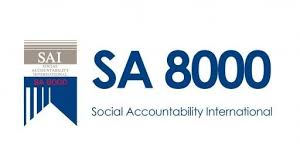SA8000 - Social Accountability

The Social Accountability Standard – SA8000 is a globally recognized framework for managing social responsibility in the workplace. Developed by Social Accountability International (SAI) in 1997, it applies to organizations across industries and in any country. SA8000 is based on internationally recognized standards like the Universal Declaration of Human Rights, International Labour Organization (ILO) conventions, and national laws. It focuses on creating fair and decent working conditions while promoting respect for workers’ rights, making it a leading certification program for ethical business practices.
SA8000 measures social performance in eight core areas—child labor, forced or compulsory labor, health and safety, freedom of association, discrimination, disciplinary practices, working hours, and remuneration—anchored by a management system that drives continual improvement. Regular revisions ensure the standard remains relevant to new and emerging social and human rights issues. Governments, private sector initiatives, and independent codes of conduct have recognized SA8000’s multi-sector applicability, integrating its criteria into compliance processes and incentive programs.
Certification involves audits conducted by Social Accountability Accreditation Services (SAAS) accredited bodies and ongoing compliance through regular assessments. SAI also offers resources like capacity building, stakeholder engagement, and buyer-supplier collaboration to support organizations in maintaining and improving social performance. SA8000 helps over two million workers worldwide. For more information, visit the official Social Accountability International website.

